Analyzing VARK Model: Improving Study Skills in Higher Education
VerifiedAdded on 2023/06/15
|8
|1338
|431
Report
AI Summary
This report explores the VARK learning model, developed by Neil Fleming, and its application to enhancing study skills in higher education. The VARK model includes visual, auditory, read/write, and kinesthetic learning styles, each catering to different student preferences. Visual learners benefit from diagrams and graphic organizers, while auditory learners thrive in discussions and lectures. Read/write learners prefer written materials and note-taking, and kinesthetic learners excel with hands-on activities. The report emphasizes the importance of understanding one's learning style to improve academic performance and professional development. It suggests adopting suitable learning strategies and tools, such as presentations and written exercises, to maximize knowledge acquisition. The report concludes that the VARK model offers valuable insights into optimizing learning and achieving academic success.

Study Skills for
Higher Education
Higher Education
Paraphrase This Document
Need a fresh take? Get an instant paraphrase of this document with our AI Paraphraser
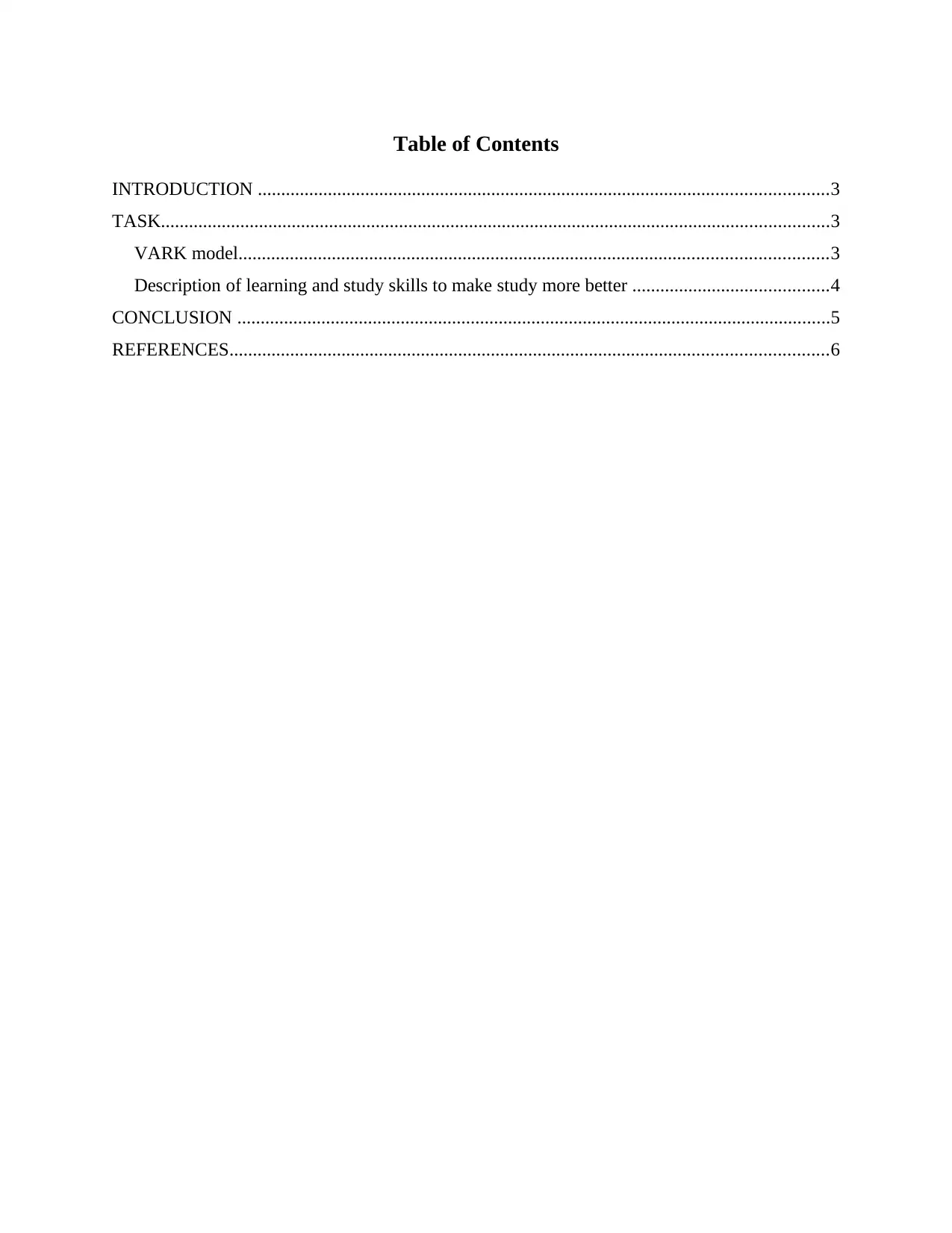
Table of Contents
INTRODUCTION ..........................................................................................................................3
TASK...............................................................................................................................................3
VARK model..............................................................................................................................3
Description of learning and study skills to make study more better ..........................................4
CONCLUSION ...............................................................................................................................5
REFERENCES................................................................................................................................6
INTRODUCTION ..........................................................................................................................3
TASK...............................................................................................................................................3
VARK model..............................................................................................................................3
Description of learning and study skills to make study more better ..........................................4
CONCLUSION ...............................................................................................................................5
REFERENCES................................................................................................................................6
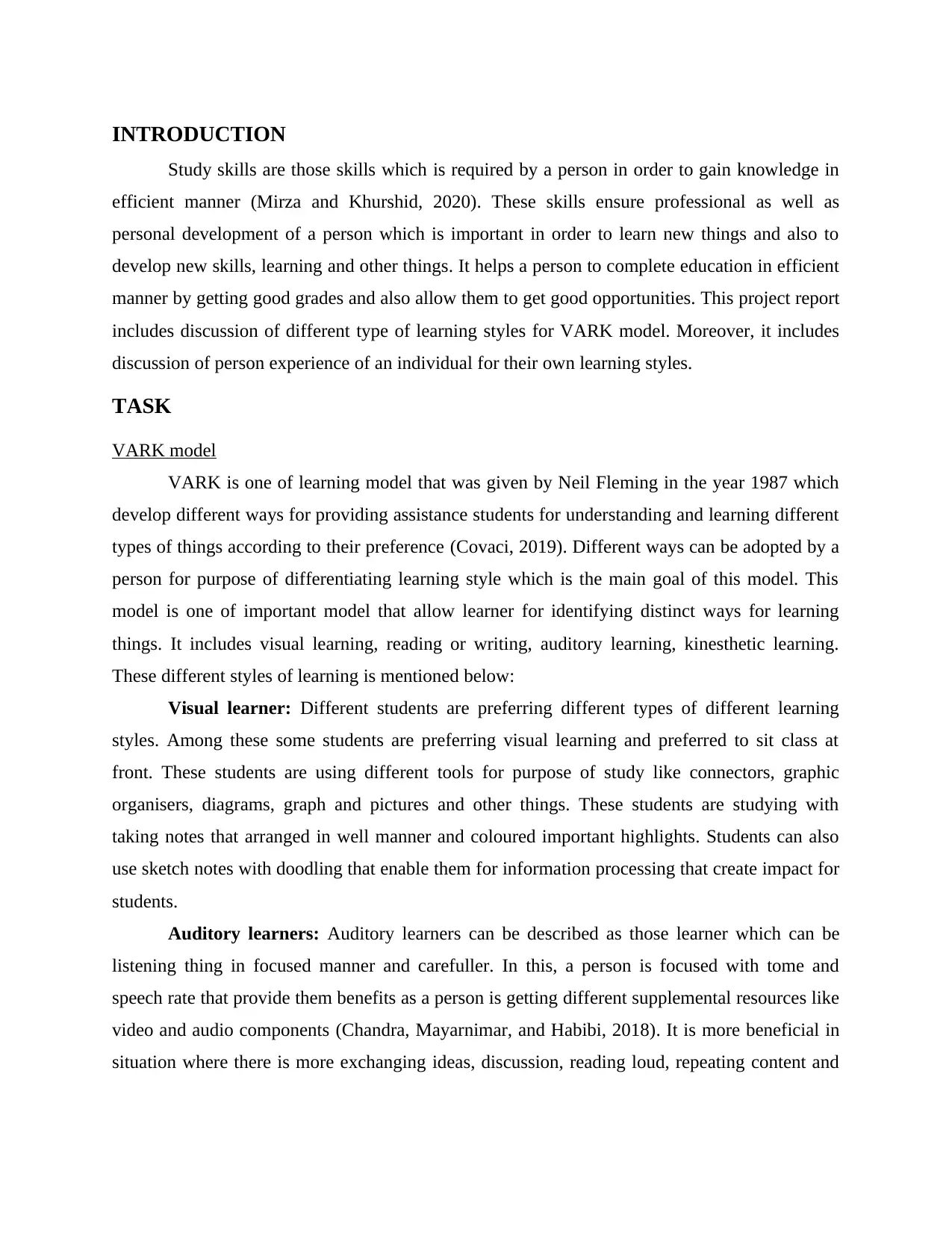
INTRODUCTION
Study skills are those skills which is required by a person in order to gain knowledge in
efficient manner (Mirza and Khurshid, 2020). These skills ensure professional as well as
personal development of a person which is important in order to learn new things and also to
develop new skills, learning and other things. It helps a person to complete education in efficient
manner by getting good grades and also allow them to get good opportunities. This project report
includes discussion of different type of learning styles for VARK model. Moreover, it includes
discussion of person experience of an individual for their own learning styles.
TASK
VARK model
VARK is one of learning model that was given by Neil Fleming in the year 1987 which
develop different ways for providing assistance students for understanding and learning different
types of things according to their preference (Covaci, 2019). Different ways can be adopted by a
person for purpose of differentiating learning style which is the main goal of this model. This
model is one of important model that allow learner for identifying distinct ways for learning
things. It includes visual learning, reading or writing, auditory learning, kinesthetic learning.
These different styles of learning is mentioned below:
Visual learner: Different students are preferring different types of different learning
styles. Among these some students are preferring visual learning and preferred to sit class at
front. These students are using different tools for purpose of study like connectors, graphic
organisers, diagrams, graph and pictures and other things. These students are studying with
taking notes that arranged in well manner and coloured important highlights. Students can also
use sketch notes with doodling that enable them for information processing that create impact for
students.
Auditory learners: Auditory learners can be described as those learner which can be
listening thing in focused manner and carefuller. In this, a person is focused with tome and
speech rate that provide them benefits as a person is getting different supplemental resources like
video and audio components (Chandra, Mayarnimar, and Habibi, 2018). It is more beneficial in
situation where there is more exchanging ideas, discussion, reading loud, repeating content and
Study skills are those skills which is required by a person in order to gain knowledge in
efficient manner (Mirza and Khurshid, 2020). These skills ensure professional as well as
personal development of a person which is important in order to learn new things and also to
develop new skills, learning and other things. It helps a person to complete education in efficient
manner by getting good grades and also allow them to get good opportunities. This project report
includes discussion of different type of learning styles for VARK model. Moreover, it includes
discussion of person experience of an individual for their own learning styles.
TASK
VARK model
VARK is one of learning model that was given by Neil Fleming in the year 1987 which
develop different ways for providing assistance students for understanding and learning different
types of things according to their preference (Covaci, 2019). Different ways can be adopted by a
person for purpose of differentiating learning style which is the main goal of this model. This
model is one of important model that allow learner for identifying distinct ways for learning
things. It includes visual learning, reading or writing, auditory learning, kinesthetic learning.
These different styles of learning is mentioned below:
Visual learner: Different students are preferring different types of different learning
styles. Among these some students are preferring visual learning and preferred to sit class at
front. These students are using different tools for purpose of study like connectors, graphic
organisers, diagrams, graph and pictures and other things. These students are studying with
taking notes that arranged in well manner and coloured important highlights. Students can also
use sketch notes with doodling that enable them for information processing that create impact for
students.
Auditory learners: Auditory learners can be described as those learner which can be
listening thing in focused manner and carefuller. In this, a person is focused with tome and
speech rate that provide them benefits as a person is getting different supplemental resources like
video and audio components (Chandra, Mayarnimar, and Habibi, 2018). It is more beneficial in
situation where there is more exchanging ideas, discussion, reading loud, repeating content and
⊘ This is a preview!⊘
Do you want full access?
Subscribe today to unlock all pages.

Trusted by 1+ million students worldwide
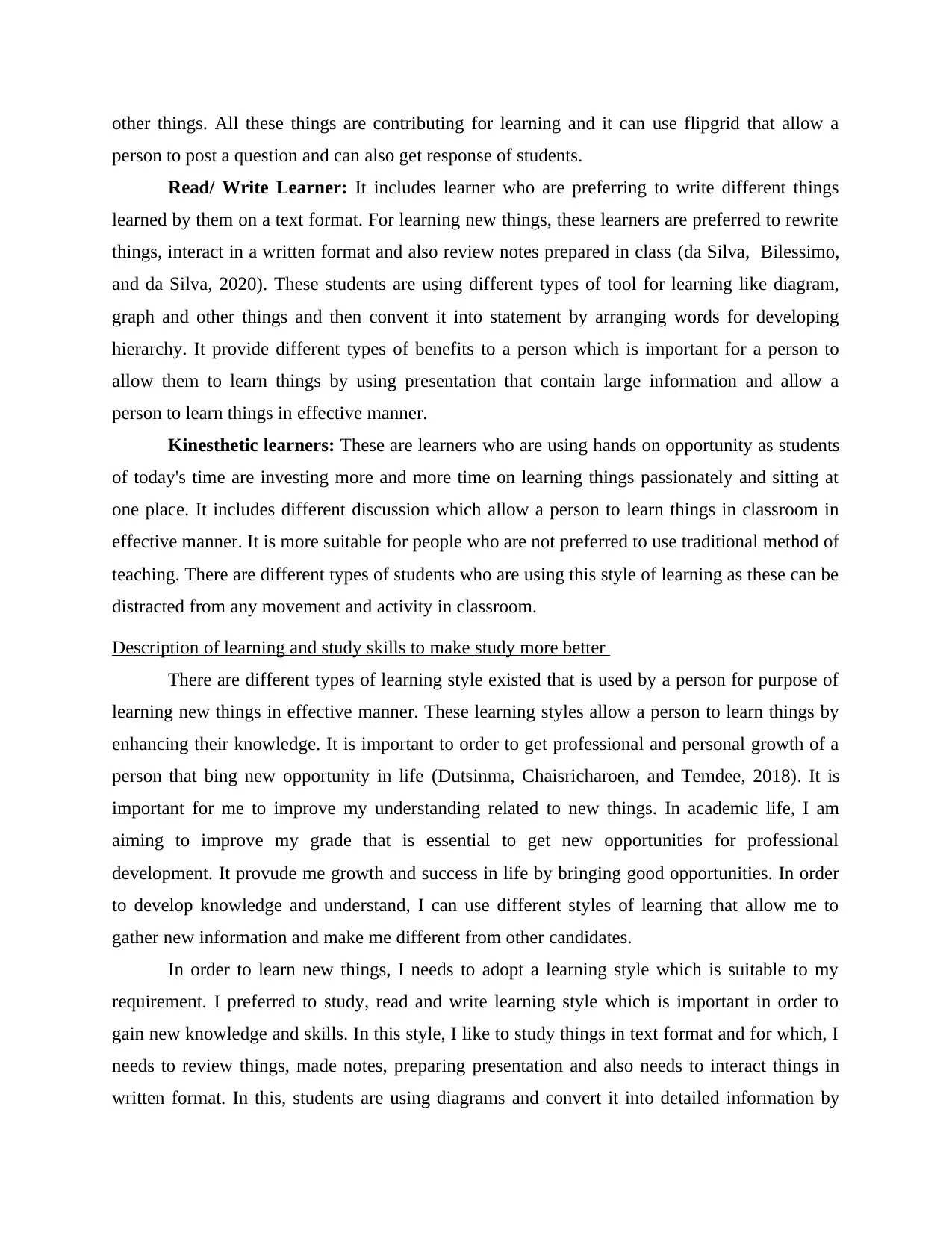
other things. All these things are contributing for learning and it can use flipgrid that allow a
person to post a question and can also get response of students.
Read/ Write Learner: It includes learner who are preferring to write different things
learned by them on a text format. For learning new things, these learners are preferred to rewrite
things, interact in a written format and also review notes prepared in class (da Silva, Bilessimo,
and da Silva, 2020). These students are using different types of tool for learning like diagram,
graph and other things and then convent it into statement by arranging words for developing
hierarchy. It provide different types of benefits to a person which is important for a person to
allow them to learn things by using presentation that contain large information and allow a
person to learn things in effective manner.
Kinesthetic learners: These are learners who are using hands on opportunity as students
of today's time are investing more and more time on learning things passionately and sitting at
one place. It includes different discussion which allow a person to learn things in classroom in
effective manner. It is more suitable for people who are not preferred to use traditional method of
teaching. There are different types of students who are using this style of learning as these can be
distracted from any movement and activity in classroom.
Description of learning and study skills to make study more better
There are different types of learning style existed that is used by a person for purpose of
learning new things in effective manner. These learning styles allow a person to learn things by
enhancing their knowledge. It is important to order to get professional and personal growth of a
person that bing new opportunity in life (Dutsinma, Chaisricharoen, and Temdee, 2018). It is
important for me to improve my understanding related to new things. In academic life, I am
aiming to improve my grade that is essential to get new opportunities for professional
development. It provude me growth and success in life by bringing good opportunities. In order
to develop knowledge and understand, I can use different styles of learning that allow me to
gather new information and make me different from other candidates.
In order to learn new things, I needs to adopt a learning style which is suitable to my
requirement. I preferred to study, read and write learning style which is important in order to
gain new knowledge and skills. In this style, I like to study things in text format and for which, I
needs to review things, made notes, preparing presentation and also needs to interact things in
written format. In this, students are using diagrams and convert it into detailed information by
person to post a question and can also get response of students.
Read/ Write Learner: It includes learner who are preferring to write different things
learned by them on a text format. For learning new things, these learners are preferred to rewrite
things, interact in a written format and also review notes prepared in class (da Silva, Bilessimo,
and da Silva, 2020). These students are using different types of tool for learning like diagram,
graph and other things and then convent it into statement by arranging words for developing
hierarchy. It provide different types of benefits to a person which is important for a person to
allow them to learn things by using presentation that contain large information and allow a
person to learn things in effective manner.
Kinesthetic learners: These are learners who are using hands on opportunity as students
of today's time are investing more and more time on learning things passionately and sitting at
one place. It includes different discussion which allow a person to learn things in classroom in
effective manner. It is more suitable for people who are not preferred to use traditional method of
teaching. There are different types of students who are using this style of learning as these can be
distracted from any movement and activity in classroom.
Description of learning and study skills to make study more better
There are different types of learning style existed that is used by a person for purpose of
learning new things in effective manner. These learning styles allow a person to learn things by
enhancing their knowledge. It is important to order to get professional and personal growth of a
person that bing new opportunity in life (Dutsinma, Chaisricharoen, and Temdee, 2018). It is
important for me to improve my understanding related to new things. In academic life, I am
aiming to improve my grade that is essential to get new opportunities for professional
development. It provude me growth and success in life by bringing good opportunities. In order
to develop knowledge and understand, I can use different styles of learning that allow me to
gather new information and make me different from other candidates.
In order to learn new things, I needs to adopt a learning style which is suitable to my
requirement. I preferred to study, read and write learning style which is important in order to
gain new knowledge and skills. In this style, I like to study things in text format and for which, I
needs to review things, made notes, preparing presentation and also needs to interact things in
written format. In this, students are using diagrams and convert it into detailed information by
Paraphrase This Document
Need a fresh take? Get an instant paraphrase of this document with our AI Paraphraser
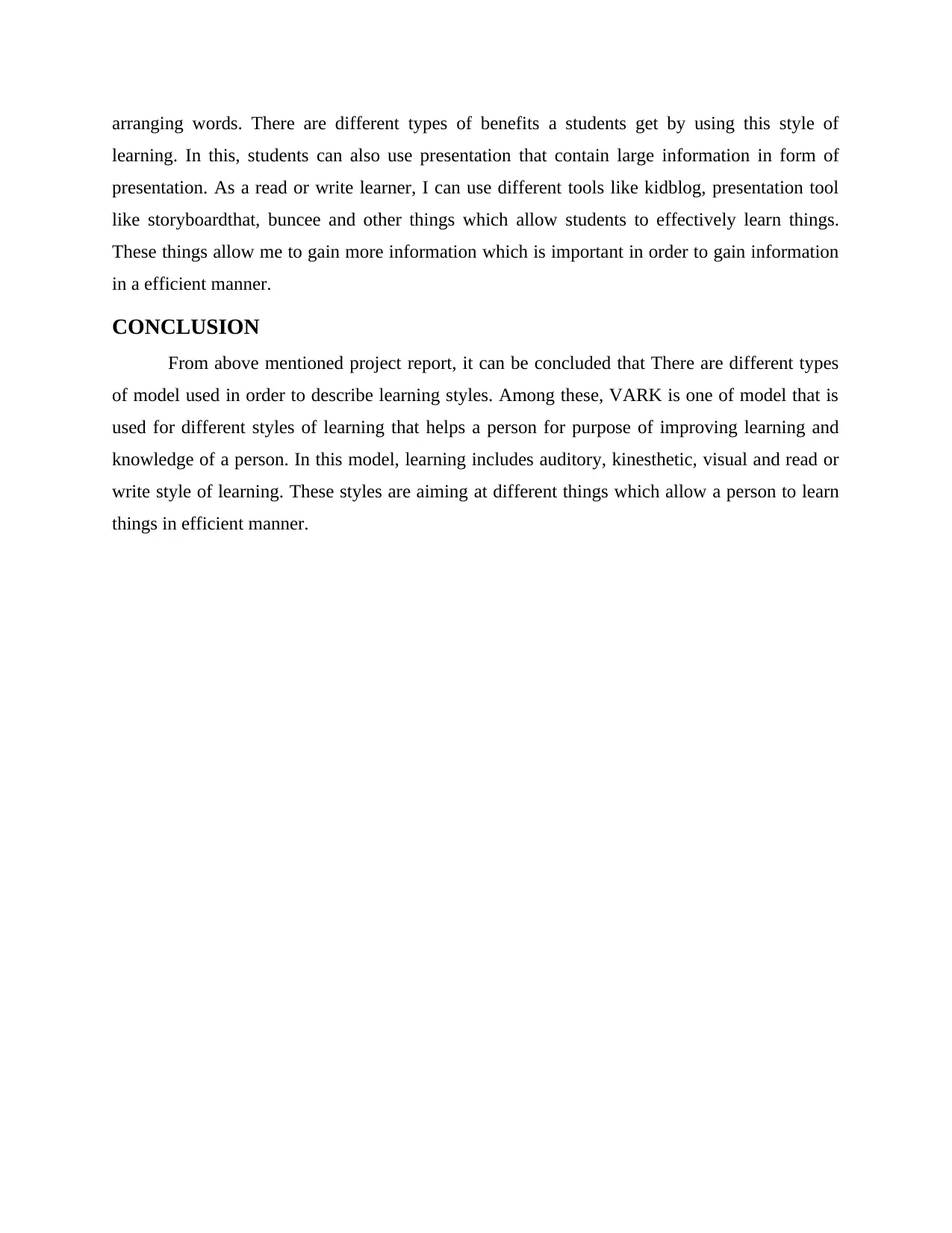
arranging words. There are different types of benefits a students get by using this style of
learning. In this, students can also use presentation that contain large information in form of
presentation. As a read or write learner, I can use different tools like kidblog, presentation tool
like storyboardthat, buncee and other things which allow students to effectively learn things.
These things allow me to gain more information which is important in order to gain information
in a efficient manner.
CONCLUSION
From above mentioned project report, it can be concluded that There are different types
of model used in order to describe learning styles. Among these, VARK is one of model that is
used for different styles of learning that helps a person for purpose of improving learning and
knowledge of a person. In this model, learning includes auditory, kinesthetic, visual and read or
write style of learning. These styles are aiming at different things which allow a person to learn
things in efficient manner.
learning. In this, students can also use presentation that contain large information in form of
presentation. As a read or write learner, I can use different tools like kidblog, presentation tool
like storyboardthat, buncee and other things which allow students to effectively learn things.
These things allow me to gain more information which is important in order to gain information
in a efficient manner.
CONCLUSION
From above mentioned project report, it can be concluded that There are different types
of model used in order to describe learning styles. Among these, VARK is one of model that is
used for different styles of learning that helps a person for purpose of improving learning and
knowledge of a person. In this model, learning includes auditory, kinesthetic, visual and read or
write style of learning. These styles are aiming at different things which allow a person to learn
things in efficient manner.
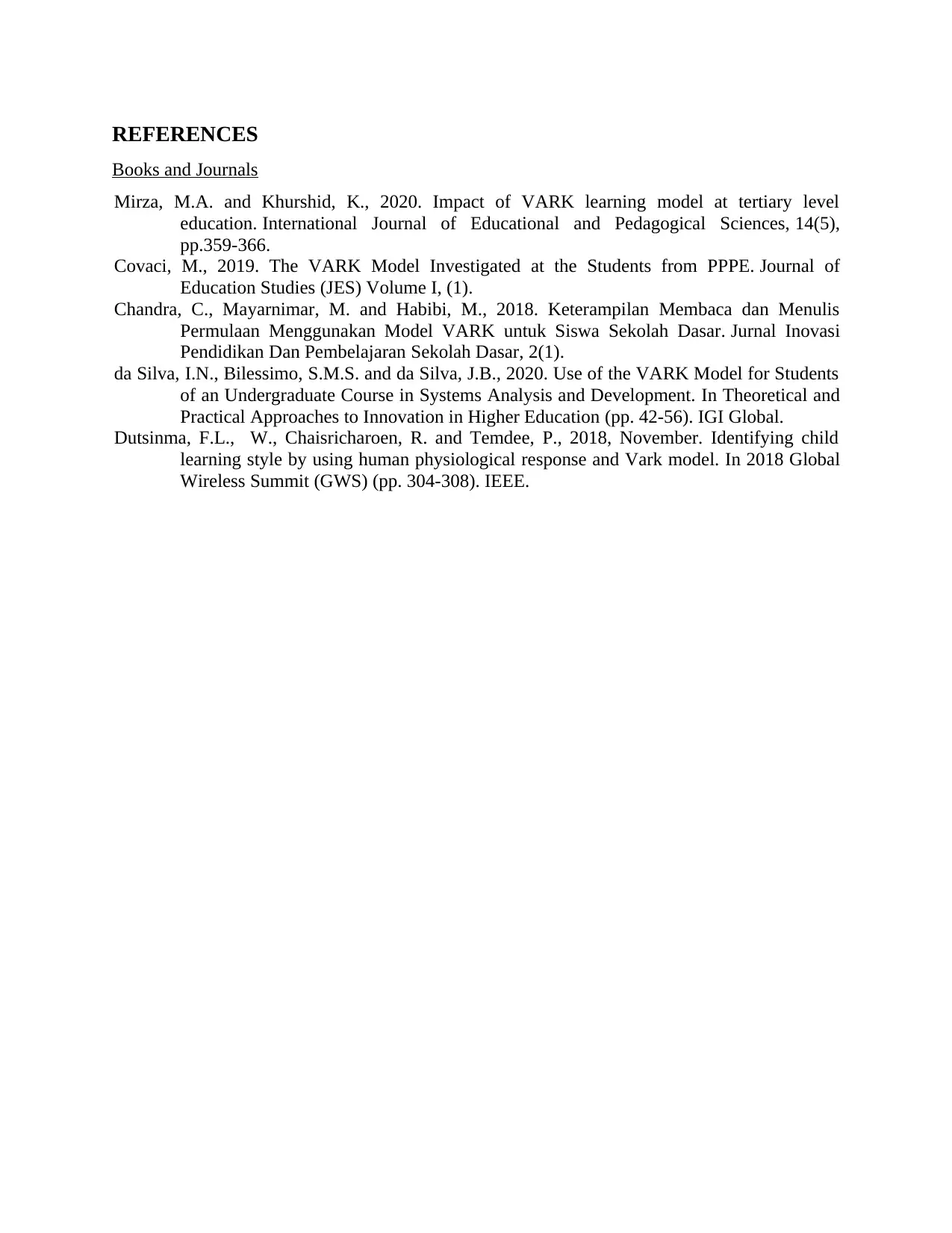
REFERENCES
Books and Journals
Mirza, M.A. and Khurshid, K., 2020. Impact of VARK learning model at tertiary level
education. International Journal of Educational and Pedagogical Sciences, 14(5),
pp.359-366.
Covaci, M., 2019. The VARK Model Investigated at the Students from PPPE. Journal of
Education Studies (JES) Volume I, (1).
Chandra, C., Mayarnimar, M. and Habibi, M., 2018. Keterampilan Membaca dan Menulis
Permulaan Menggunakan Model VARK untuk Siswa Sekolah Dasar. Jurnal Inovasi
Pendidikan Dan Pembelajaran Sekolah Dasar, 2(1).
da Silva, I.N., Bilessimo, S.M.S. and da Silva, J.B., 2020. Use of the VARK Model for Students
of an Undergraduate Course in Systems Analysis and Development. In Theoretical and
Practical Approaches to Innovation in Higher Education (pp. 42-56). IGI Global.
Dutsinma, F.L., W., Chaisricharoen, R. and Temdee, P., 2018, November. Identifying child
learning style by using human physiological response and Vark model. In 2018 Global
Wireless Summit (GWS) (pp. 304-308). IEEE.
Books and Journals
Mirza, M.A. and Khurshid, K., 2020. Impact of VARK learning model at tertiary level
education. International Journal of Educational and Pedagogical Sciences, 14(5),
pp.359-366.
Covaci, M., 2019. The VARK Model Investigated at the Students from PPPE. Journal of
Education Studies (JES) Volume I, (1).
Chandra, C., Mayarnimar, M. and Habibi, M., 2018. Keterampilan Membaca dan Menulis
Permulaan Menggunakan Model VARK untuk Siswa Sekolah Dasar. Jurnal Inovasi
Pendidikan Dan Pembelajaran Sekolah Dasar, 2(1).
da Silva, I.N., Bilessimo, S.M.S. and da Silva, J.B., 2020. Use of the VARK Model for Students
of an Undergraduate Course in Systems Analysis and Development. In Theoretical and
Practical Approaches to Innovation in Higher Education (pp. 42-56). IGI Global.
Dutsinma, F.L., W., Chaisricharoen, R. and Temdee, P., 2018, November. Identifying child
learning style by using human physiological response and Vark model. In 2018 Global
Wireless Summit (GWS) (pp. 304-308). IEEE.
⊘ This is a preview!⊘
Do you want full access?
Subscribe today to unlock all pages.

Trusted by 1+ million students worldwide

Paraphrase This Document
Need a fresh take? Get an instant paraphrase of this document with our AI Paraphraser

1 out of 8
Related Documents
Your All-in-One AI-Powered Toolkit for Academic Success.
+13062052269
info@desklib.com
Available 24*7 on WhatsApp / Email
![[object Object]](/_next/static/media/star-bottom.7253800d.svg)
Unlock your academic potential
Copyright © 2020–2026 A2Z Services. All Rights Reserved. Developed and managed by ZUCOL.

